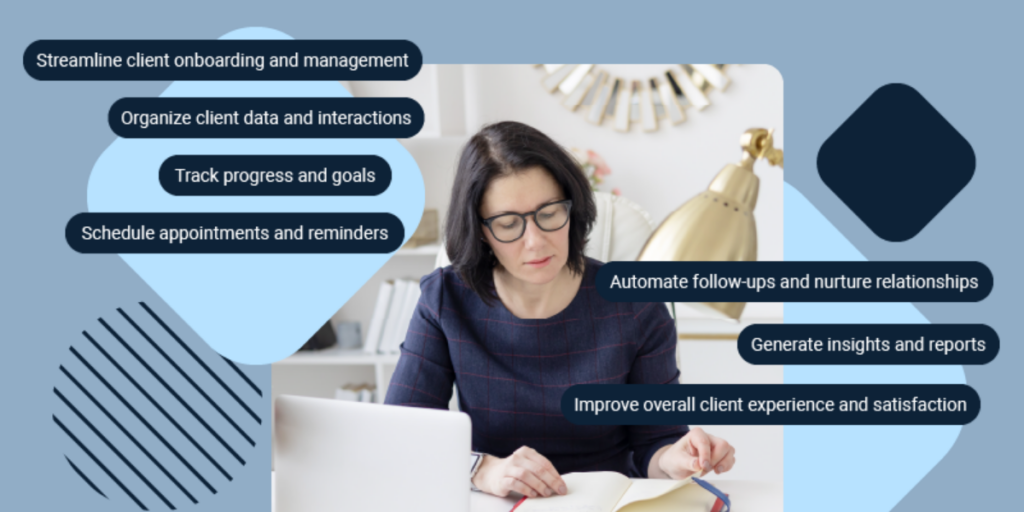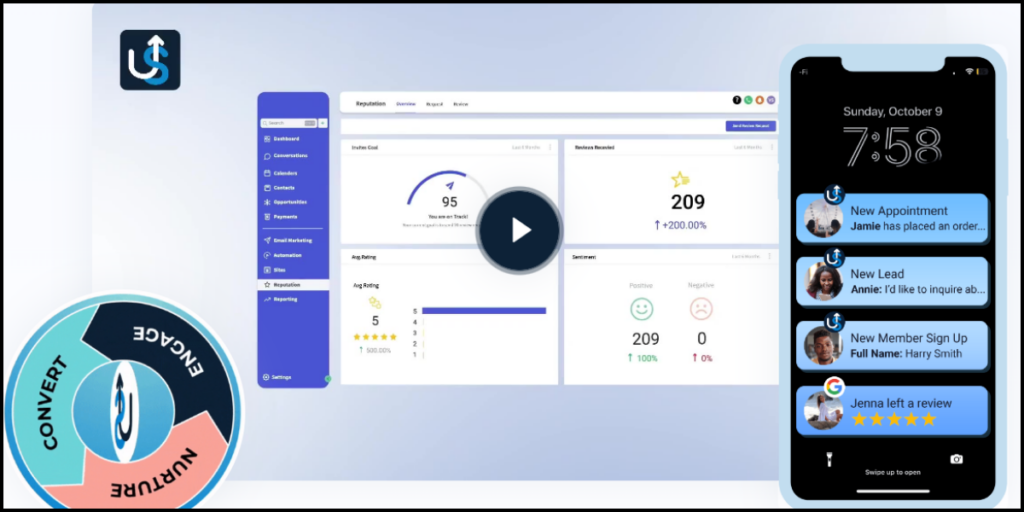
Life coaching is about guiding clients toward achieving their personal and professional goals. Yet, many coaches struggle with the administrative side of running their practice. Without the right tools, managing client relationships, tracking progress, and keeping everything organized can become a daily struggle.
That’s where a Customer Relationship Management (CRM) system comes into play. A CRM can streamline and simplify your operations, letting you focus more on what you do best: guiding clients toward success. In this blog, we dive into the five biggest challenges life coaches face when they don’t have a CRM—and explore how adopting the right tool can help overcome these hurdles.

For life coaches, juggling multiple clients means tracking vast amounts of information—client histories, preferences, session notes, and ongoing progress. However, without a CRM, coaches must rely on a mix of spreadsheets, sticky notes, and scattered email threads.
The Small Business Trends reported that 50% of small businesses face challenges in managing customer data due to outdated tools.
Imagine searching through disorganized folders for a critical detail from a client’s last session or missing out on a significant personal update that could impact the coaching process. The mental load of keeping track of these details without a structured system is overwhelming, leading to errors and missed opportunities for deeper client connections.
A significant part of a life coach’s role is to keep clients accountable for their goals. Yet, when tracking progress relies on handwritten notes or basic digital logs, it’s easy for important milestones to slip through the cracks.
According to a survey by the Coaching Federation, 60% of clients attribute their success to consistent progress tracking.
However, without a CRM, life coaches may struggle to provide timely updates and adjustments to coaching plans, risking a decline in client motivation. This lack of structure can make the coaching experience feel disjointed and may lead to client dissatisfaction.

Time is a life coach’s most valuable resource, yet managing it efficiently without a CRM can feel like an uphill battle. The scheduling challenges range from accidentally double-booking sessions to forgetting follow-ups or letting reminders slip through the cracks.
A report by Deloitte highlighted that over 45% of service professionals experience burnout due to poor time management and inefficient scheduling tools.
The risk of missed or conflicting appointments can create frustration for both the coach and their clients, damaging the trust that is so essential in a coaching relationship. For many life coaches, these scheduling issues become a constant source of stress, limiting their ability to focus on the transformative work they do with clients.
Managing the financial side of a coaching business is another major challenge, especially when it comes to billing and payment tracking. Without a CRM, coaches often have to navigate between different tools for creating invoices, sending reminders, and recording payments.
The 2023 Small Business Report found that 43% of small business owners lose track of payments when relying on manual methods.
This disorganized approach not only consumes precious time but can also strain the coach-client relationship when payments are delayed or mishandled.

Building strong, lasting relationships with clients is critical for life coaches, who depend on referrals and repeat business to sustain their practice. However, without a CRM, nurturing these relationships can feel like an impossible task.
Coaches must remember important dates, client milestones, and opportunities for follow-up—all without the aid of automated reminders.
According to HubSpot, businesses that do not maintain regular engagement with their clients see a 60% reduction in retention rates.
The result is that many life coaches find themselves missing chances to reconnect with past clients, leading to fewer referrals and lost opportunities for continued coaching engagements. Without a structured system, maintaining a network of satisfied clients becomes an elusive goal.
Now that we’ve explored the significant challenges life coaches face without a CRM, let’s discuss how adopting a CRM can address these issues effectively.
A well-designed CRM for life coaches can transform the way life coaches run their practice, allowing them to focus more on what they do best—guiding their clients toward success.

A CRM system simplifies the process of managing client details. By centralizing client profiles, session notes, communication history, and other data, a CRM ensures that everything is easily accessible. This means no more wasting time searching through emails or notes to recall the details of a client’s journey.
With a CRM, life coaches can set up automated goal-tracking systems that monitor client progress in real-time. Coaches can input goals, track milestones, and adjust plans based on each client’s development.
A CRM with integrated scheduling features allows life coaches to book, manage, and organize appointments seamlessly. Automated reminders reduce the risk of missed sessions, ensuring a smooth and efficient workflow.
Handling billing and payments manually can be a time-consuming process that eats into coaching hours. A CRM with billing automation solves this by generating invoices, tracking payments, and sending reminders for overdue accounts.
Maintaining strong, long-term client relationships is critical for life coaches who rely on referrals and repeat business. A CRM helps by setting reminders for birthdays, anniversaries, or follow-up sessions, ensuring coaches remain in touch with past clients.

Managing the challenges mentioned above becomes far more manageable with the right CRM, and Upsurge CRM is designed with life coaches in mind. Here’s why it stands out:
Client Relationship Management: Upsurge CRM centralizes client information, making it easy to access communication history, session notes, and personal preferences. This ensures coaches can offer personalized guidance without the stress of digging through disorganized records.
Goal Setting and Tracking: The goal-tracking feature in Upsurge CRM allows life coaches to monitor progress seamlessly. Coaches can set milestones and adjust strategies based on real-time data, ensuring clients stay motivated and on course.
Automated Billing and Payment Tracking: With Upsurge CRM, the complexities of invoicing and payment tracking are simplified. Automated invoices and reminders ensure that coaches spend less time on administrative work and more time focusing on their clients.
Task and Reminder Management: Upsurge CRM’s scheduling tools make it easy to manage appointments, set follow-ups, and avoid scheduling conflicts. Automated reminders help coaches maintain a consistent workflow, reducing the chances of missed sessions.
Life coaching is about providing support and accountability to clients, but the behind-the-scenes work can become a significant burden without the right tools. The challenges of managing client data, tracking progress, maintaining schedules, handling payments, and nurturing relationships are real and impactful.
However, a CRM system can ease these difficulties, allowing life coaches to focus on what truly matters: helping clients achieve their goals. For those ready to eliminate the daily struggles of manual processes, Upsurge CRM offers a comprehensive solution that aligns with the unique needs of life coaching businesses.
Don’t let administrative challenges hold you back. Invest in the right tools and empower yourself to make a bigger impact on your clients’ lives. Ready to transform your coaching business? Discover how Upsurge CRM for life coaches can help you streamline your operations and unlock your full potential.
